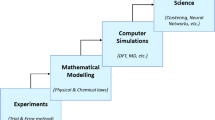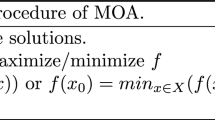Abstract
Real-life decision problems are usually so complex they cannot be modeled with a single objective function, thus creating a need for clear and efficient techniques of handling multiple criteria to support the decision process. The most commonly used technique is Goal Programming. It is clear and appealing, but in the case of multiobjective optimization problems strongly criticized due to its noncompliance with the efficiency (Pareto-optimality) principle. On the other hand, the reference point method, although using similar control parameters as Goal Programming, always generates efficient solutions. In this paper, we show how the reference point method can be modeled within the Goal Programming methodology. It allows us to simplify implementations of the reference point method as well as shows how Goal Programming with relaxation of some traditional assumptions can be extended to a multiobjective optimization technique meeting the efficiency principle.
Similar content being viewed by others
References
A. Charnes and W.W. Cooper,Management Models and Industrial Applications of Linear Programming (Wiley, New York, 1961).
M. Grauer, A. Lewandowski and A.P. Wierzbicki, DIDAS — theory, implementation and experience, in:Interactive Decision Analysis, ed. M. Grauer and A.P. Wierzbicki (Springer, Berlin, 1984).
A. Hallefjord and K. Jornsten, A critical comment on integer Goal Programming, J. Oper. Res. Soc. 39(1988)101–104.
J.P. Ignizio,Goal Programming and Extensions (Heath, Lexington, 1976).
J.P. Ignizio,Linear Programming in Single and Multiple Objective Systems (Prentice-Hall, Englewood Cliffs, 1982).
J.P. Ignizio, On the merits and demerits of integer Goal Programming, J. Oper. Res. Soc. 40(1989)781–785.
Y. Ijiri,Management Goals and Accounting for Control (Rand-McNally, Chicago, 1965).
S. Lee,Goal Programming for Decision Analysis (Auerbach, Philadelphia, 1972).
A. Lewandowski and A.P. Wierzbicki (eds.),Aspiration Based Decision Support Systems — Theory, Software and Applications (Springer, Berlin, 1989).
Lindo Systems,What's Best! Release 1.77 (Lindo Systems, Inc., Chicago, 1992).
H.A. Simon,Models of Man (MacMillan, New York, 1957).
R.E. Steuer,Multiple Ctiteria Optimization — Theory, Computation and Applications (Wiley, New York, 1986).
Storm Software,STORM Personal Version 3.0 (Storm Systems, Inc., Cleveland, 1992).
M.D. Troutt, S.K. Tadisina and R.J. Clinton, Interactive optimization aspects of electronic spreadsheet models for design and planning, J. Oper. Res. Soc. 42(1991)349–355.
D.J. White, A bibliography on the applications of mathematical programming multiple-objective methods, J. Oper. Res. Soc. 41(1990)669–691.
A.P. Wierzbicki, A mathematical basis for satisficing decision making, Math. Modelling 3(1982)391–405.
A.P. Wierzbicki, On completeness and constructiveness of parametric characterizations to vector optimization problems, OR Spektrum 8(1986)391–405.
M. Zeleny, A concept of compromise solutions and the method of displaced ideal, Comp. Oper. Res. 1(1974)479–496.
Author information
Authors and Affiliations
Rights and permissions
About this article
Cite this article
Ogryczak, W. A Goal Programming model of the reference point method. Ann Oper Res 51, 33–44 (1994). https://doi.org/10.1007/BF02032079
Issue Date:
DOI: https://doi.org/10.1007/BF02032079




